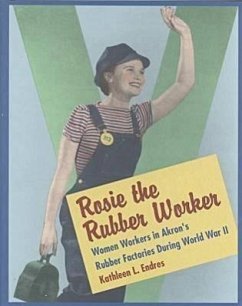In this richly illustrated book, Kathleen L. Endres examines the lives of women working in the rubber industry during World War II. Women who entered the industrial workplace during the war were popularized by Rosie the Riveter, a cultural icon that is perhaps one of the most enduring images of women's mobilization on the American home front. Posters, magazine covers, popular music, and advertisements all romanticized the vision of patriotic women entering the factory and picking up "where the men left off". Endres points out that women were not new to the factories of Akron. Years before the war, many women had been balancing their home lives with working in these factories. And while the war did offer new opportunities to such groups as African Americans, women had been present in the rubber industry for decades, relegated to the lower paid "less skilled" jobs, which often required more manual dexterity than the jobs left for the "skilled" labor of men. Drawing upon heretofore unavailable archival materials and oral histories, Rosie the Rubber Worker offers readers a personal as well as scholarly account of the era and highlights the important role many women played in wartime production and how their work affected their lives during the war and after.








